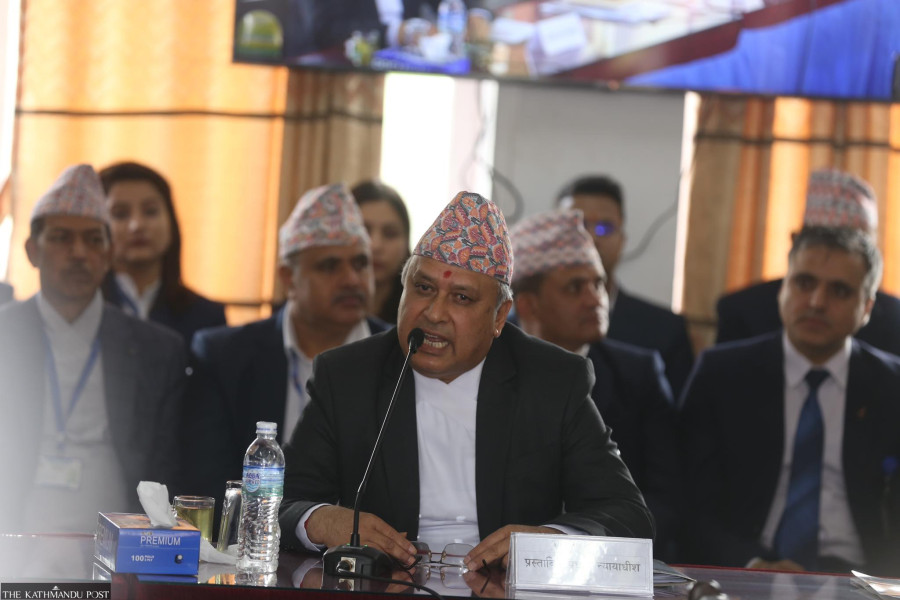National
Chief Justice nominee Karki presents his vision to Hearing Committee
He may not get to implement his vision as he retires on August 5.
Post Report
Chief justice nominee Hari Krishna Karki on Thursday made a presentation before the Parliamentary Hearing Committee where he shared his vision highlighting his plans and the initiatives he would take should he be appointed to lead the judiciary.
Karki said he would formulate policy for institutional reforms in the judiciary if he gets appointed as the chief justice. Zero tolerance against corruption and effective monitoring and supervision to minimise corruption were the other plans he presented. Karki also assured the committee that as chief justice, he would be working towards giving common people easy access to the court.
The committee decided to conduct Karki’s hearing in two phases: first allowing him to present what qualities he possesses to become the chief justice, which will be followed by a question-answer session with the lawmakers. “The probable chief justice presented his justification on Thursday. He will face the questions from the lawmakers on Friday,” Nirmala Devi Lamichhane, a joint-secretary on the committee, told the Post.
During his presentation, Karki also said that the workload was increasing in the judiciary with every passing year. The caseload which was 166,176 in 2012-2013 had increased to 339,961 in the previous fiscal year. There are 28,350 cases in the Supreme Court of which 4,184 are as old as five years, or more.
He blamed the failure in increasing the human resources at par with the workload to be the major problem in clearing the cases languishing in different tiers of the courts.
The members of the hearing committee will question Karki while also asking him to clarify on the complaints lodged against him. As many as 29 complaints have been lodged by 38 people, including a sitting judge of a district court. The complainants have claimed that as Karki has failed to maintain the dignity of the position as the acting chief justice, he shouldn’t be appointed the chief of the judiciary. They also argued that appointing Karki as the chief justice would only result in a waste of the state’s resources.
The Constitutional Council on May 8 nominated Karki, the senior-most justice in the Supreme Court, for the chief justice’s role and forwarded his name to the Parliamentary Hearing Committee. On May 30, the committee had invited complaints against Karki. The hearing committee had received 29 complaints until the deadline ended on Friday.
Prior to allowing Karki to present his plan, the hearing committee had allowed the complainants to provide a basis to their complaints.
Karki was appointed the acting chief justice on October 5 last year. The Supreme Court has been headless after Cholendra Shumsher Rana faced an impeachment motion in the second week of February last year. Rana retired as the chief justice on December 13, without the Parliament deciding on the motion. Senior-most justice Deepak Kumar Karki then led the judiciary as the acting chief justice for seven months.
Article 292 of the constitution requires the chief justice, justices, and those nominated to constitutional commissions and ambassadorial posts to clear parliamentary hearings before they are administered the oath of office. President Ramchandra Paudel will appoint Karki as the chief justice, if the committee endorses his recommendation.
“The hearing committee on Friday will decide whether or not to endorse the recommendation,” said Lamichhane.
Only a two-thirds majority of the 15-member committee can reject the nomination. Even if Karki becomes the chief justice, he will not have the time to execute the plan that he has presented before the parliamentary committee as he is set to retire on August 5 after attaining the retirement age. As there is the practice of taking exit from the court hearings a month before retiring, he won’t be working, effective from July 5.
Bishowambhar Prasad Shrestha will succeed Karki as the head of judiciary.




 10.12°C Kathmandu
10.12°C Kathmandu














